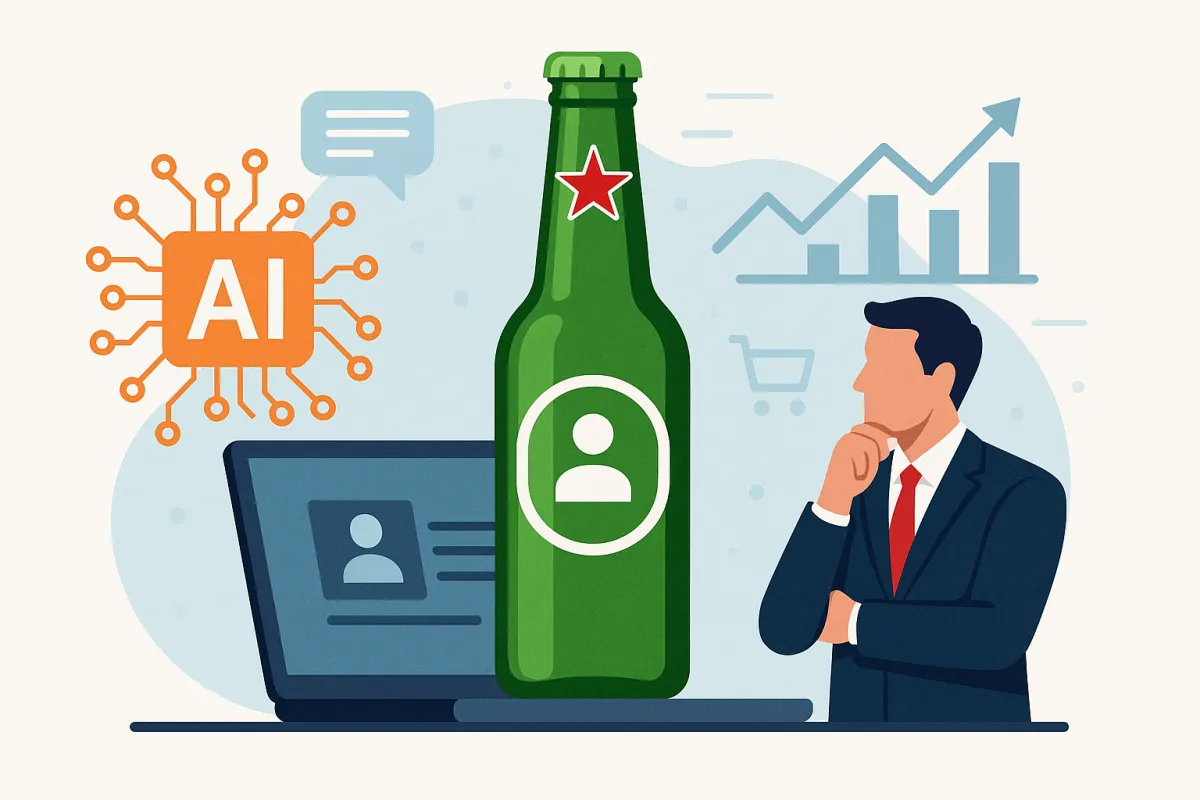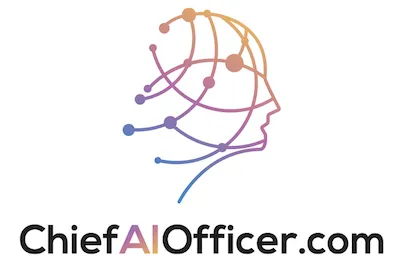
How Heineken Uses AI to Sell Smarter, Not Harder
How Heineken Uses AI to Sell Smarter,
Not Harder
Heineken has integrated artificial intelligence deeply into global operations, using it as core driver for efficiency, personalization, and smarter selling strategies rather than simply scaling traditional sales efforts. Their focus leverages data for better decisions, stronger customer relationships, and new growth opportunities across markets.
Their AIDDA (Artificial Intelligence Data-Driven Advisor) provides sales representatives with actionable, data-driven recommendations, transforming reps from order-takers to strategic business partners. Scaled to eight markets with about 490,000 customer engagements daily, AIDDA delivers measurable sales uplifts including 5% increase in Mexico.
This isn't just beverage industry innovation. This is a blueprint for AI-driven sales transformation that demonstrates how artificial intelligence creates competitive advantages through intelligence amplification rather than effort multiplication.
The 490,000 Daily Engagement Scale
Heineken's AIDDA system manages 490,000 customer engagements daily across eight markets, demonstrating AI-powered sales capability that traditional relationship management approaches cannot achieve at comparable scale and consistency.
The engagement scale reveals how AI creates customer interaction capabilities that human-dependent sales approaches cannot match through automated intelligence and personalized recommendation generation.
Consumer brands that rely on traditional sales approaches will find themselves relationship-limited compared to AI-enhanced engagement that provides personalized interaction at massive scale.
The 5% Mexico Sales Uplift Achievement
Heineken achieved 5% sales increase in Mexico through AI-driven customer recommendations, representing measurable revenue impact that flows directly to competitive advantage and market share growth.
The uplift achievement demonstrates how AI creates sales performance that traditional approaches cannot achieve through data-driven personalization and strategic customer guidance.
Sales organizations that maintain traditional approaches will find themselves revenue-limited compared to AI-enhanced sales that achieve superior conversion and customer value optimization.
The Strategic Partner Transformation
AIDDA transforms sales representatives from order-takers to strategic business partners by providing actionable data-driven recommendations for individual customers based on comprehensive behavior analysis.
The transformation reveals how AI creates sales role enhancement that elevates human capability rather than replacing sales professionals with automated systems.
Sales teams that maintain traditional order-taking approaches will find themselves value-limited compared to AI-enhanced strategic partnership that provides superior customer advisory capabilities.
The Intelligent Product Recommendation Engine
Heineken's Product Recommender analyzes customer behavior and preferences to suggest targeted products, enhancing personalization while boosting conversion rates through data-driven customer understanding.
The recommendation engine demonstrates how AI creates customer insight capabilities that traditional sales approaches cannot achieve through behavioral analysis and predictive preference modeling.
Consumer brands that use traditional product promotion will find themselves conversion-limited compared to AI-enhanced recommendations that optimize customer satisfaction and revenue generation.
The Promo Advisor Optimization
AI-powered Promo Advisor simulates, plans, and optimizes targeted promotions, ensuring marketing investments drive maximum return on investment and incremental sales through intelligent campaign management.
The optimization capability reveals how AI creates marketing efficiency that traditional campaign management cannot achieve through predictive modeling and ROI optimization.
Marketing organizations that rely on traditional promotion planning will find themselves ROI-limited compared to AI-enhanced optimization that maximizes campaign effectiveness and revenue impact.
The Hyper-Localized Marketing Personalization
AI aggregates data from numerous digital touchpoints to segment customers by real-time behavior rather than static demographics, enabling hyper-localized campaigns and dynamic creative optimization.
The personalization approach demonstrates how AI creates marketing capabilities that traditional segmentation cannot achieve through real-time behavioral analysis and dynamic content adaptation.
Consumer brands that use demographic segmentation will find themselves engagement-limited compared to AI-enhanced behavioral targeting that provides superior personalization and conversion optimization.
The 40% Click-Through Rate Improvement
Heineken achieves 40% higher click-through rates and 35% lower acquisition costs through AI-powered marketing personalization that optimizes engagement and conversion efficiency.
The improvement achievement reveals how AI creates marketing performance that traditional approaches cannot match through optimization that simultaneously increases engagement and reduces costs.
Marketing campaigns that maintain traditional targeting will find themselves cost-disadvantaged compared to AI-enhanced optimization that achieves superior results at lower acquisition expense.
The Generative AI Content Creation
AI creates tailored advertising and social content, enabling rapid experimentation and precise targeting for diverse markets and cultures without requiring extensive manual content development.
The content creation capability demonstrates how AI creates marketing agility that traditional content production cannot achieve through automated generation and cultural adaptation.
Marketing teams that rely on manual content creation will find themselves speed-limited compared to AI-enhanced generation that enables rapid market response and cultural customization.
The E-Commerce Optimization Integration
Heineken partners with firms like WPP to use advanced AI tools for shopper marketing, retail initiatives, and e-commerce optimization, streamlining both digital and in-person sales strategies.
The integration approach reveals how AI creates omnichannel capabilities that traditional sales approaches cannot achieve through unified optimization across digital and physical customer touchpoints.
Retail brands that maintain separate channel strategies will find themselves consistency-limited compared to AI-enhanced omnichannel optimization that provides seamless customer experience.
The Demand Forecasting Intelligence
AI powers demand forecasting systems that align production with real-time sales data, reducing both overstocking and shortages while optimizing inventory management for profitability and customer satisfaction.
The forecasting intelligence demonstrates how AI creates supply chain capabilities that traditional planning cannot achieve through real-time analysis and predictive optimization.
Consumer goods companies that use traditional forecasting will find themselves inventory-challenged compared to AI-enhanced prediction that optimizes stock levels and reduces waste.
The Knowledge Management Revolution
AI knowledge engines make Heineken's consumer insights and market data accessible through natural language queries, enabling every employee to leverage data for smarter decision-making.
The knowledge revolution reveals how AI creates organizational intelligence that traditional data systems cannot provide through conversational access and democratized insights.
Companies that limit data access to specialists will find themselves decision-limited compared to AI-enhanced knowledge democratization that empowers enterprise-wide intelligence.
The Conversational AI Customer Service
Multilingual chatbots and virtual assistants handle majority of customer inquiries, improving response times while allowing human representatives to focus on value-added interactions.
The customer service enhancement demonstrates how AI creates support capabilities that traditional call centers cannot achieve through automated intelligence and human resource optimization.
Customer service operations that rely entirely on human agents will find themselves cost and availability-limited compared to AI-enhanced support that provides superior efficiency and coverage.
The Gamification and Engagement Innovation
AI-driven brand ambassadors enable interactive experiences including trivia and contests, deepening emotional connections and loyalty among customers through personalized engagement.
The engagement innovation reveals how AI creates brand relationship capabilities that traditional marketing cannot achieve through interactive personalization and emotional connection building.
Consumer brands that maintain traditional engagement will find themselves relationship-limited compared to AI-enhanced interaction that creates deeper customer loyalty and brand affinity.
The Global AI Innovation Lab
Heineken established global AI innovation lab to scale generative and predictive AI across departments, ensuring systematic AI capability development and organizational transformation.
The innovation lab demonstrates how successful AI transformation requires dedicated organizational commitment rather than departmental initiatives when achieving enterprise-wide capability development.
Companies that approach AI through departmental projects will find themselves transformation-limited compared to dedicated innovation laboratories that drive systematic AI advancement.
The Company-Wide AI Literacy
Heineken invests in AI literacy and upskilling across the organization, ensuring every employee from sales representatives to executives can make data-informed decisions.
The literacy investment reveals how AI transformation requires workforce development rather than just technology deployment when creating sustainable competitive advantages.
Organizations that implement AI without workforce education will achieve limited adoption compared to comprehensive training that enables enterprise-wide AI capability utilization.
The Ethical AI Deployment Framework
Heineken maintains ethical and responsible AI deployment with human expertise shaping and supervising all AI tools, ensuring technology serves business objectives while maintaining ethical standards.
The framework approach demonstrates how successful AI implementation requires ethical considerations and human oversight rather than autonomous technology deployment.
Companies that implement AI without ethical frameworks will face regulatory and reputational risks compared to responsible approaches that integrate ethics into AI capability development.
The Process Automation Efficiency
AI automates repetitive sales and marketing tasks, freeing staff for high-value relationship-building and creative activities that require human expertise and emotional intelligence.
The automation efficiency reveals how AI creates workforce optimization that eliminates routine work while preserving human involvement in strategic activities that drive competitive advantage.
Organizations that maintain manual repetitive processes will find themselves productivity-limited compared to AI-enhanced automation that optimizes human focus on high-value activities.
The Operational Excellence Integration
Heineken's AI transformation delivers higher productivity, personalized marketing, greater operational efficiency, and faster data-driven decisions across the entire organization.
The excellence integration demonstrates how comprehensive AI implementation creates systematic competitive advantages rather than isolated improvements that don't affect organizational performance.
Consumer brands that implement limited AI applications miss opportunities for operational transformation that comprehensive AI integration provides through enterprise-wide optimization.
The Competitive Market Positioning
Heineken's AI capabilities create market positioning advantages that traditional consumer goods approaches cannot match through intelligence-driven sales and marketing optimization.
The positioning advantages reveal how AI transformation affects competitive dynamics by enabling superior customer engagement and operational efficiency that traditional approaches cannot achieve.
Consumer brands that delay AI transformation will find themselves competitively disadvantaged compared to AI-enhanced organizations that provide superior customer experience and market responsiveness.
The Strategic Investment Philosophy
Heineken's AI investment represents strategic commitment to intelligence amplification rather than effort multiplication, creating sustainable competitive advantages through smarter rather than harder approaches.
The investment philosophy demonstrates how market leaders approach AI as fundamental business strategy rather than operational efficiency tool when creating long-term competitive positioning.
Companies that limit AI investment to efficiency improvements miss opportunities for strategic transformation that comprehensive AI implementation provides through intelligence enhancement.
The Future Consumer Goods Reality
Heineken's AI success establishes consumer goods reality where intelligence-driven sales and marketing become essential for competitive positioning rather than optional enhancement.
The future reality reveals why consumer goods AI transformation requires immediate strategic commitment rather than gradual evaluation that delays competitive advantage while AI leaders establish market dominance.
The choice facing every consumer goods executive is whether to implement AI-driven sales intelligence or accept competitive disadvantage to organizations that sell smarter through artificial intelligence rather than harder through traditional effort multiplication.
The Executive Decision Framework
Heineken's AI implementation provides decision framework that consumer goods executives can adapt for their own sales transformation and competitive positioning requirements.
The framework prioritizes intelligence amplification over effort multiplication, customer personalization over mass marketing, and strategic partnership over transactional relationships.
Organizations that apply comprehensive AI-driven sales strategies will achieve competitive advantages while companies focused on traditional approaches will struggle to compete with intelligence-enhanced customer engagement and operational optimization.
The evidence is compelling: Heineken manages 490,000 daily customer engagements and achieves 5% sales uplift through AI that transforms sales representatives into strategic partners. The strategic choice facing every executive is whether to implement AI-driven sales intelligence or accept competitive disadvantage to organizations that leverage artificial intelligence for smarter customer engagement and revenue optimization.

